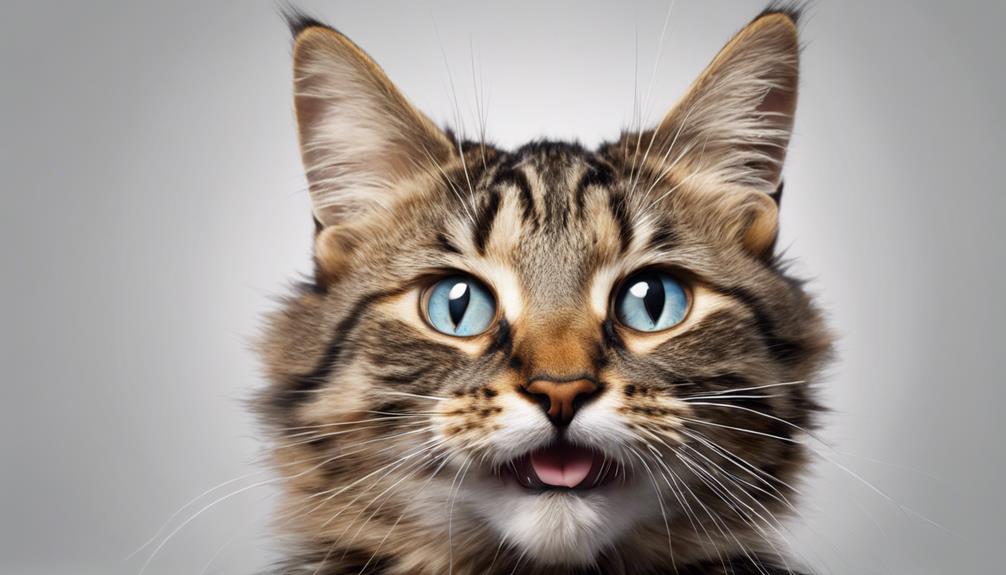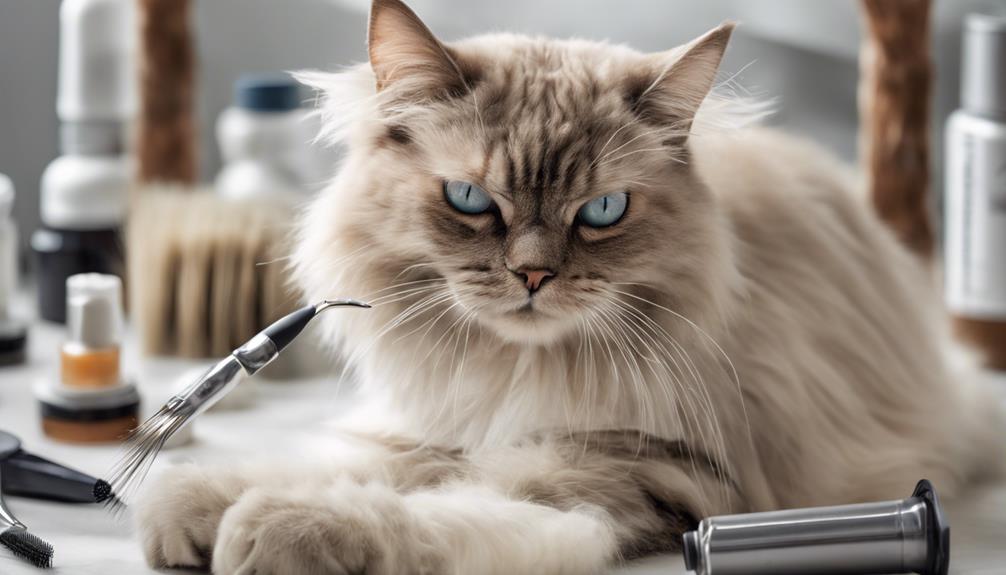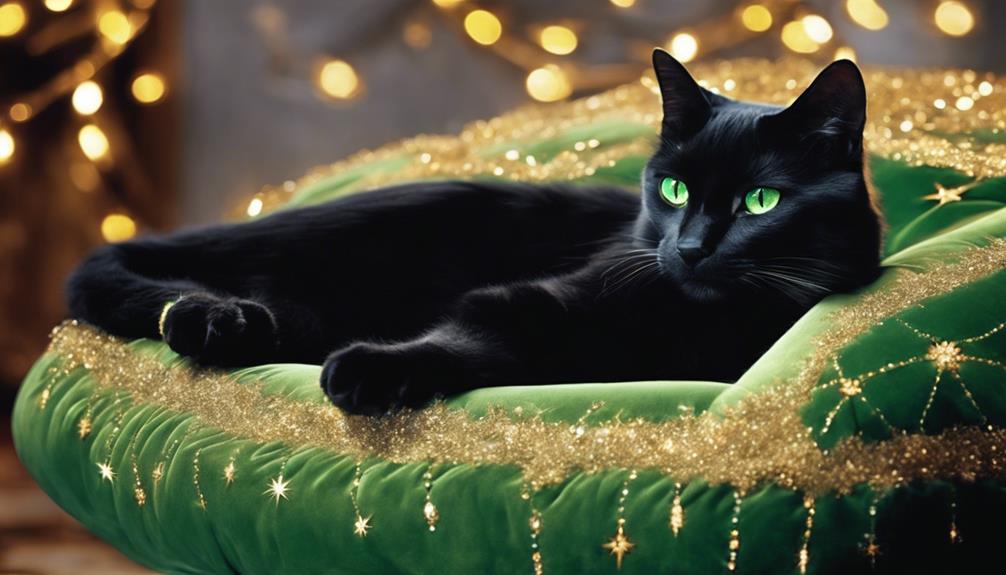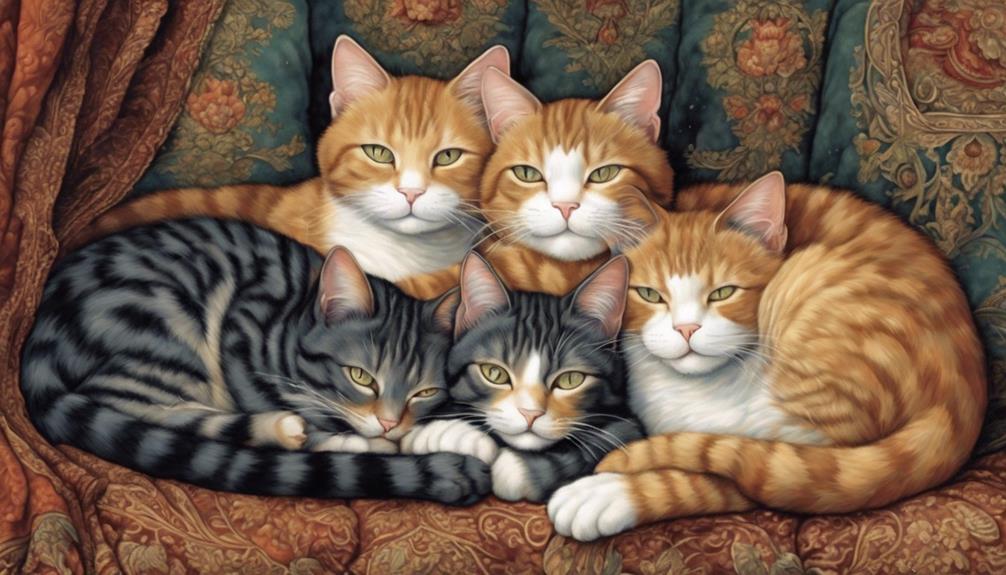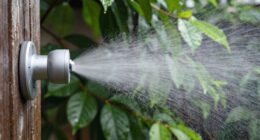Cat panting while playing may signal excitement, heat regulation, or even anxiety. Keep an eye out for open-mouth breathing, rapid breaths, and excessive tongue protrusion. Ensure your furball has time to cool down and rest during vigorous play sessions. Pay attention to body temperature, energy levels, and signs of fatigue. Create a calm play environment to reduce stress-induced panting. If panting persists or appears excessive, seek veterinary care promptly to rule out health issues. Providing breaks, monitoring breathing, and offering rest periods during play can help manage panting. Proper care and observation are key to a healthy, happy cat.
Key Takeaways
- Monitor your cat's breathing patterns during play for signs of excessive panting.
- Provide frequent breaks to allow your cat to rest and recover during playtime.
- Ensure a cool and comfortable play environment to prevent overheating and excessive panting.
- Watch for any unusual behaviors or signs of distress while playing with your cat.
- Seek veterinary care if your cat continues to pant excessively or shows other concerning symptoms.
Signs of Panting in Cats
When cats pant during play, they exhibit signs such as open-mouth breathing, rapid breaths, and tongue protrusion. It's essential to monitor these signals closely to ensure our feline friends are comfortable and safe during their playful moments.
Panting in cats, especially after a vigorous play session, is a natural way for them to regulate their body temperature and catch their breath. By keeping an eye on the duration and intensity of panting episodes, we can gauge if our cats are enjoying themselves or if they might need a break.
Understanding these signs allows us to create a cool and calm environment post-play, aiding our cats in recovering smoothly from their panting episodes. By being attentive to these subtle cues and responding accordingly, we can ensure that our cats have a joyful and comfortable playtime experience.
Let's pay attention to the signs our cats show us, as they communicate their needs even when they can't speak.
Common Causes of Cat Panting
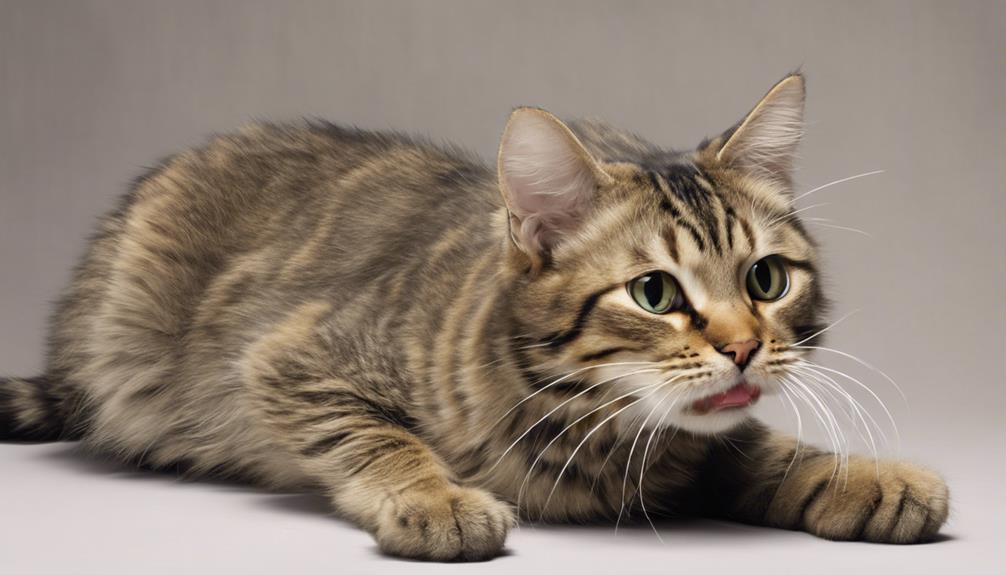
After observing the signs of panting in cats during play, it's important to understand the common causes of this behavior. Cats may pant while playing due to excitement and increased physical activity. When our feline friends engage in vigorous play sessions, their bodies heat up, and panting helps regulate their temperature.
Just like us after a workout, cats pant to cool down when they exert themselves during play. The combination of increased heart rate and rapid breathing during these active moments can lead to panting in cats. It's a natural response to the physical demands of playtime.
While panting during play is generally normal, it's essential to keep an eye on our cats. Prolonged or excessive panting could signal an underlying issue that may require veterinary attention. Understanding why our cats pant while playing allows us to better care for them and ensure they're happy and healthy during their playful adventures.
Impact of Exercise on Cat Panting
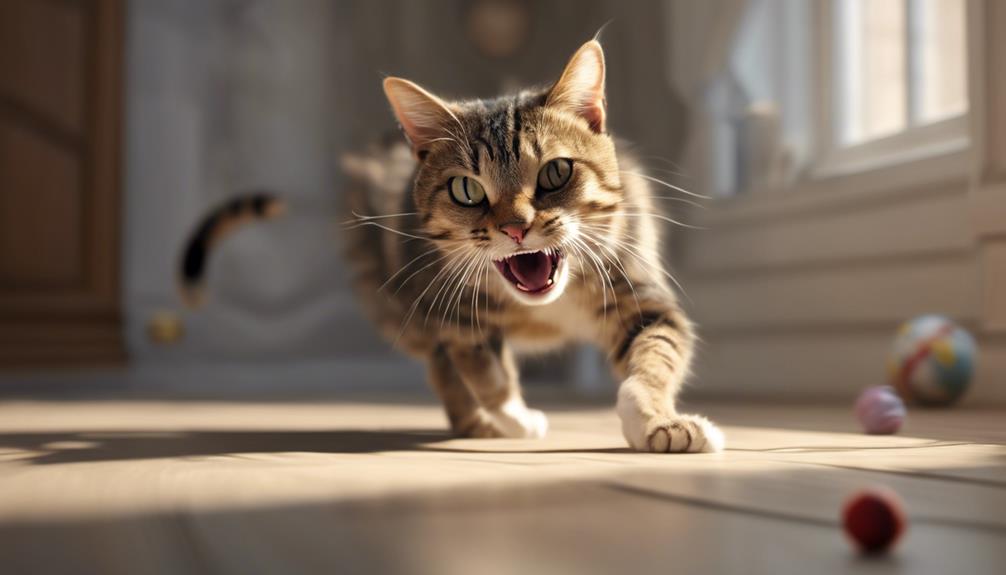
Engaging in physical activity can significantly impact a cat's panting behavior during play. When our furry friends exercise, they naturally regulate their body temperature through panting. This panting helps them cool down and catch their breath, much like how we might sweat during a workout. It's common for cats to pant after play sessions, and this should gradually subside as they rest and recover.
To prevent overexertion, it's essential to monitor your cat's energy levels during play. Watch for signs of excessive panting or fatigue, as this could indicate that they need a break. After exercise, ensure your cat has access to a cool environment and fresh water to aid in their recovery. This post-play cool down period is crucial for helping your cat return to a comfortable body temperature and recharge for their next adventure. Remember, a balance of exercise and rest is key to keeping your feline friend happy and healthy.
Recognizing Heat-Related Panting
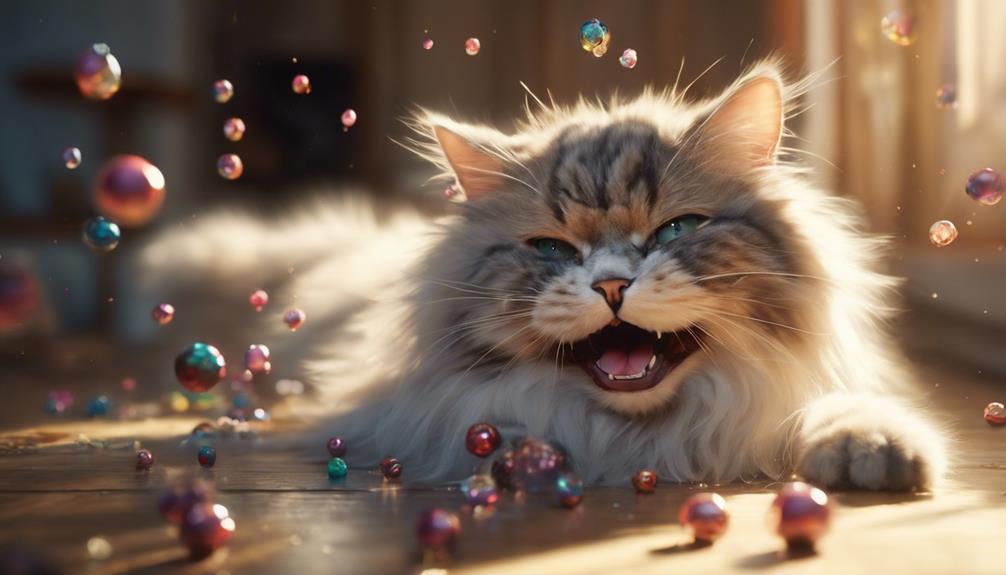
During play, cats may pant to regulate their body temperature in response to heat. Heat-related panting is a natural way for cats to cool down when they start feeling too warm. When you notice your cat panting excessively, it could be a sign that they're struggling to maintain a comfortable body temperature in a hot environment.
Cats may also exhibit behaviors like seeking shade, grooming themselves more frequently, or lying on cool surfaces to help regulate their body temperature.
It's crucial to keep a close eye on your cat during playtime, especially in hot weather, to prevent heat-related issues like heatstroke. Signs of heatstroke in cats include rapid breathing, lethargy, and excessive drooling. If you suspect your cat is experiencing heatstroke, it's essential to provide them with a cool, quiet space to relax and seek immediate veterinary attention to ensure their well-being.
Addressing Anxiety-Induced Panting
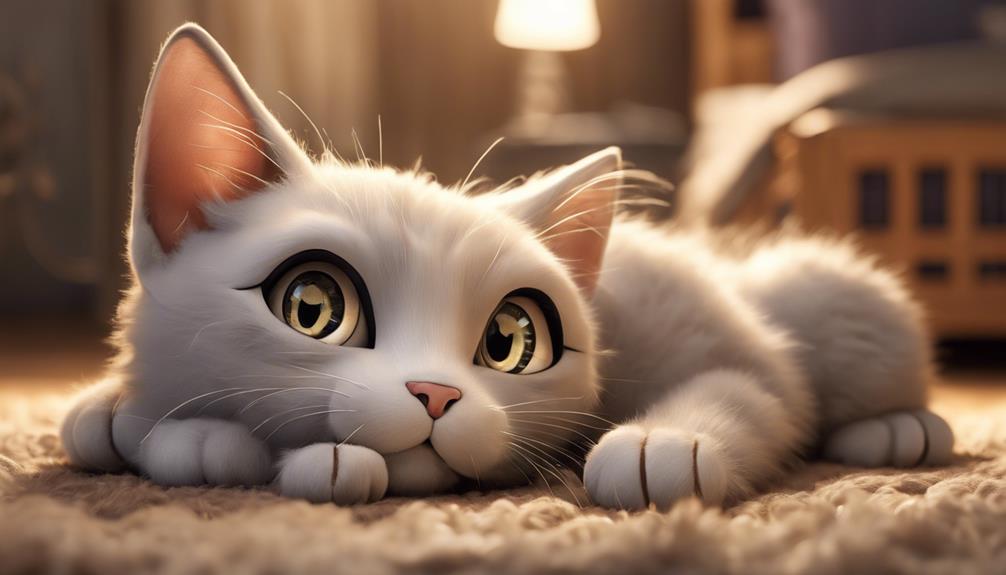
When a cat exhibits panting behavior during play, it may signal anxiety-induced stress rather than heat regulation. Anxiety-induced panting can be triggered by unfamiliar places or disruptions, causing your feline friend to feel uneasy during playtime. If you notice stress-related panting in your cat, creating a calm and familiar environment can make a significant difference. Offering a quiet space where your cat feels secure and providing favorite toys or comfort items can help alleviate anxiety triggers that lead to panting.
Understanding your cat's behavior and recognizing what may be causing their anxiety during play is crucial for their well-being. By addressing the root of the issue and making small adjustments to their environment or play routine, you can help reduce anxiety-induced panting and ensure your cat feels more at ease. Remember, a little bit of extra attention and care can go a long way in promoting a stress-free and enjoyable playtime for your beloved pet.
Health Concerns Behind Cat Panting
Cat panting while playing can be a warning sign of various health issues that require prompt attention from pet owners. It's essential to be aware of potential underlying problems that could be causing your cat to pant excessively during playtime.
Here are some health concerns that may be behind your cat's panting:
- Respiratory Infections: Cats can develop respiratory infections that lead to difficulties in breathing, resulting in panting, coughing, and wheezing.
- Heart Failure: Panting accompanied by symptoms like pale gums and a rapid heart rate could indicate heart failure, a serious condition that requires immediate veterinary attention.
- Airway Blockages: Objects ingested or inhaled during play can obstruct the airways, causing panting in cats. It's crucial to ensure a safe environment for your cat to prevent such incidents.
Understanding these potential health issues can help you identify the cause of your cat's panting and take appropriate action to ensure their well-being.
Managing Panting During Playtime
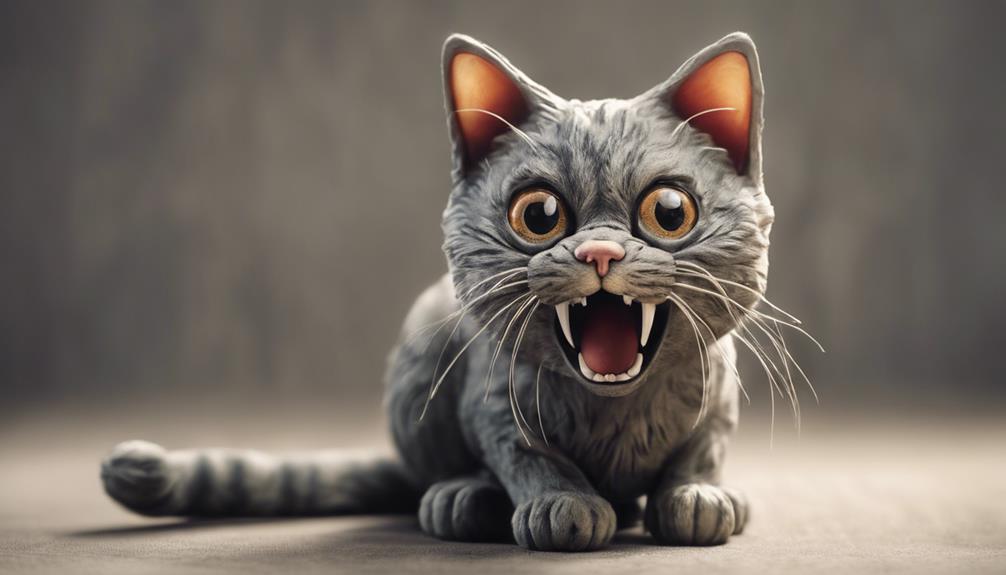
To effectively manage panting during playtime, it's crucial to monitor your cat's breathing and provide necessary breaks to prevent excessive panting. Keep an eye on how your feline friend is breathing while engaging in play, ensuring it stays within a healthy range.
Intense play sessions can lead to overexertion, so remember to offer your cat frequent breaks to rest and catch their breath. Creating a cool and comfortable environment for play can also help reduce the likelihood of panting. Avoid pushing your cat too hard during play to prevent panting and potential health issues.
If panting persists or seems excessive despite these measures, it may be wise to consult a veterinarian. They can provide guidance on whether there are any underlying health concerns contributing to the panting. By monitoring playtime, offering breaks, and maintaining a suitable play environment, you can help manage your cat's panting and ensure their well-being.
Seeking Veterinary Care for Cat Panting
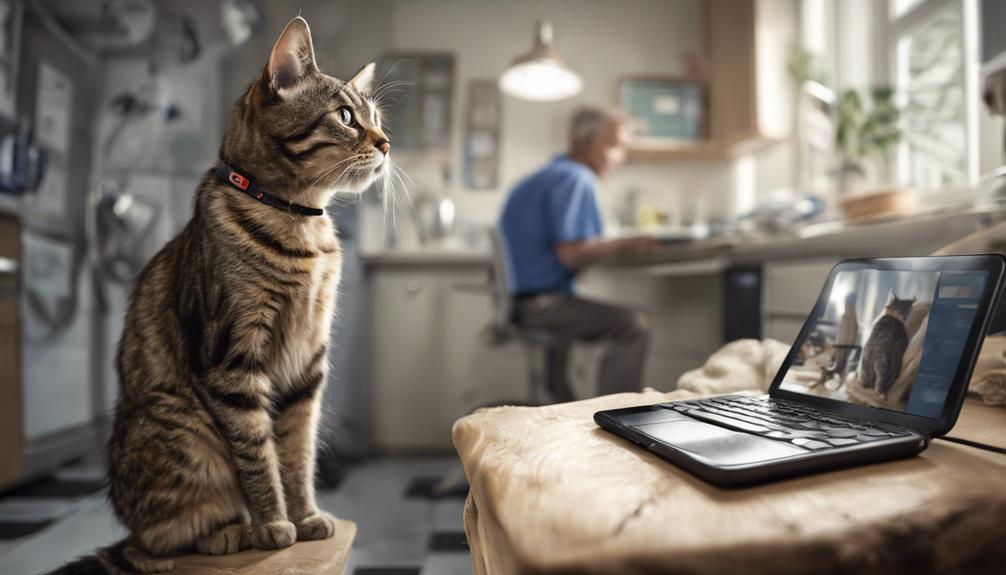
If your cat is panting excessively during play, seeking veterinary care is crucial.
It's important to have a vet evaluate your cat to rule out any underlying health issues causing the prolonged panting.
Urgent care might be necessary to address any serious concerns related to your cat's panting.
Vet Evaluation for Panting
Seeking veterinary care promptly for your panting cat is crucial to accurately diagnose and address any underlying health issues. Vets play a vital role in evaluating your cat's panting while playing, focusing on their respiratory health and overall well-being. Here are three key reasons why a vet evaluation is essential:
- Comprehensive Examination: Vets can conduct a thorough assessment to determine the root cause of your cat's panting.
- Early Intervention: Timely veterinary care can help identify and address any serious medical conditions contributing to the panting.
- Regular Monitoring: Regular check-ups with a vet are important to monitor your cat's condition and ensure any concerns related to panting while playing are promptly addressed.
Urgent Care if Necessary
When our cat pants excessively while playing, immediate veterinary care is crucial. Panting during play can sometimes be a sign of an underlying health issue that requires urgent attention.
If you notice your cat panting heavily, along with symptoms like lethargy, coughing, or changes in behavior, it's essential to seek veterinary care promptly. Veterinarians can conduct thorough examinations to diagnose any medical conditions causing your cat to pant excessively during play.
Early intervention is key, as timely treatment can lead to better outcomes for cats experiencing panting during playtime. Remember, our furry friends rely on us to ensure their well-being, so never hesitate to reach out to a professional if you have concerns about your cat's health.
Frequently Asked Questions
Is It OK for Cats to Pant While Playing?
It's totally normal for cats to pant while playing. Panting helps them regulate body temperature. As long as they recover quickly, it's usually fine. Keep an eye on their energy levels and make sure they have water.
Why Is My Cat Panting During Playtime?
We noticed our cat panting during playtime. Cats pant to cool down and regulate their temperature when exerting themselves. It's normal as long as they recover quickly. Monitoring their panting helps ensure they don't overexert.
How Do You Calm a Cat That Is Panting?
When our cat is panting, we gently offer a quiet spot to relax, stroke them to soothe stress, and provide cool water. Avoid loud noises, monitor closely, and ensure they return to calm after play.
Why Does My Cat Pant When Playing Hard?
When cats pant while playing hard, it's their way of regulating body temperature and cooling down. It shows they're putting in extra physical effort. Increased heart rate and respiration help them cope with intense play.
Conclusion
In conclusion, understanding why your cat is panting while playing is crucial for their health and well-being.
One interesting statistic to consider is that up to 30% of cats may experience panting during or after playtime due to various reasons.
By recognizing the signs, addressing the causes, and seeking veterinary care when needed, you can ensure your feline friend stays happy and healthy during their playful moments.
Stay informed and attentive to your cat's needs for a purrfectly enjoyable playtime experience.
